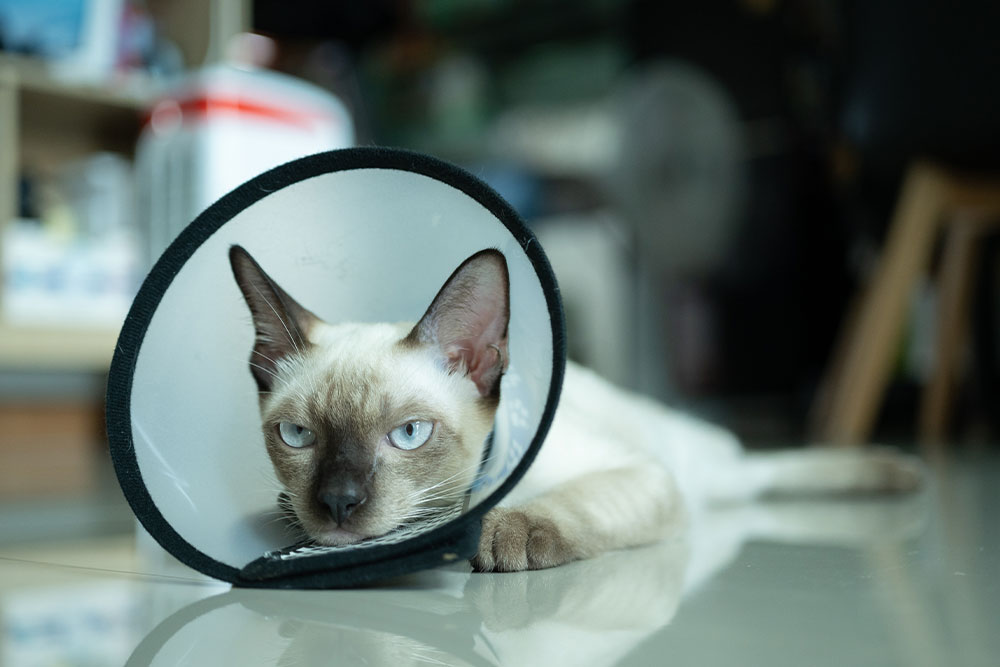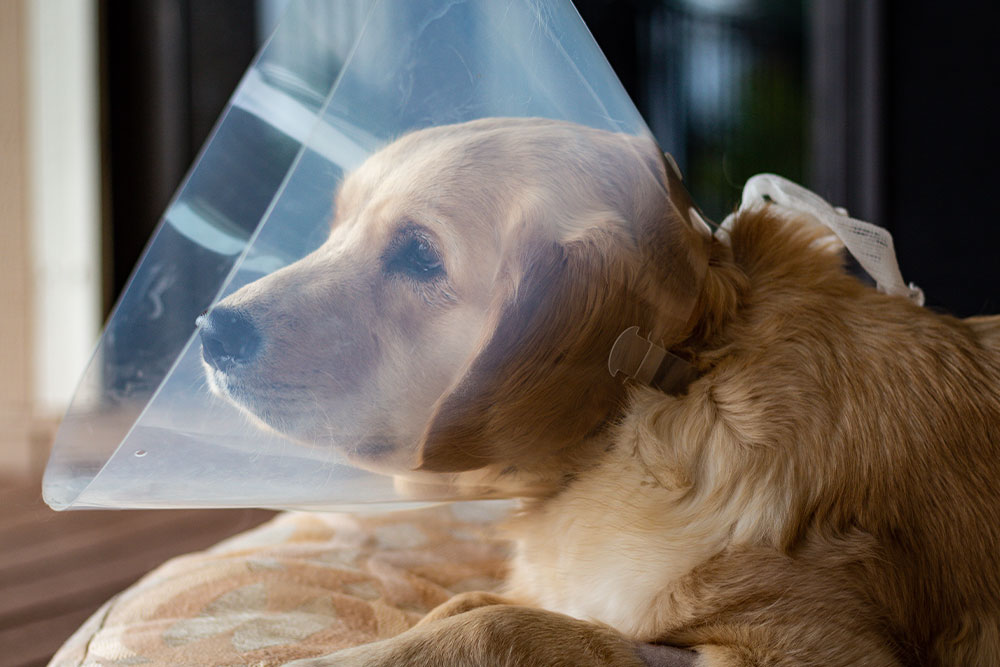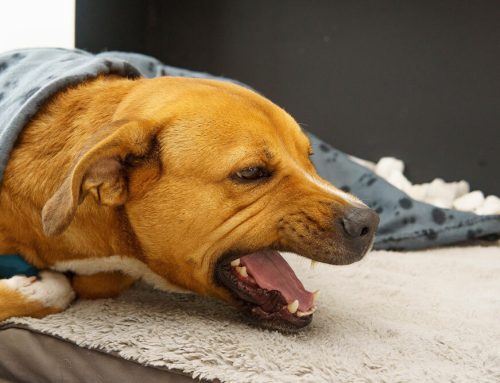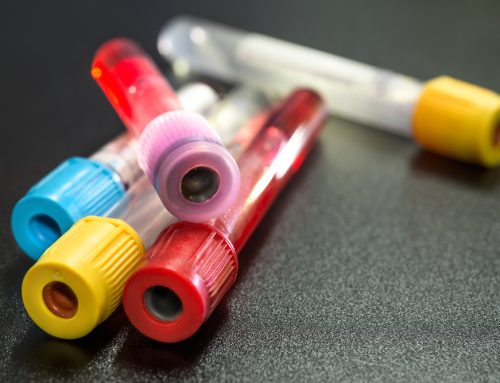Post-Surgery Recovery for Pets: Why Cones, Rest, and the Right Care Matter
Bringing your pet home after surgery is often a relief- you’ve made it through the hardest part. But in reality, the healing journey is just beginning. The days and weeks after a procedure are some of the most critical, and what you do at home makes a huge difference in how smoothly your pet recovers.
At the Animal Medical Hospital of Naples, our mission is Empathy, Always. We know that cones and crate rest aren’t fun for pets or their people. Still, these tools, along with advanced pain management and careful monitoring, are essential in preventing setbacks. This guide explains why confinement and protection matter so much, what complications they help avoid, and how our team supports safe healing with world-class services.
The Truth About Crate Rest: Protecting Surgical Repairs
After a procedure, whether it’s a routine spay or neuter or an orthopedic surgery, tissue repair takes time. Without controlled rest, one leap off the couch or a sudden sprint can tear sutures or strain fragile healing tissue. Strict rest helps by:
- Keeping sutures and internal repairs intact
- Reducing inflammation and swelling
- Supporting effective pain control
- Preventing re-injury that could require repeat surgery
Helping Pets Cope With Confinement During Recovery
Not every pet takes crate rest in stride. Some bark, cry, scratch, or try to escape, which not only increases stress but also puts surgical sites at risk. While confinement is non-negotiable for safe healing, there are ways to make it more manageable for both you and your pet.
For dogs who dislike crates, alternatives may include restricting them to a small room, or keeping them on a short leash attached to you or a sturdy object such as your desk or chair while you’re working. The goal is to prevent unsupervised movement- running, jumping, and climbing can undo weeks of healing in an instant.
For cats, recovery suites in quiet rooms work well, with litter, food, water, and bedding arranged so that no jumping is required.
If your pet becomes highly anxious despite these strategies, sedation or anti-anxiety medications may be necessary to keep recovery safe and calm. Our veterinarians can discuss these options as part of your pet’s veterinary surgical care plan, tailoring the approach to their individual needs.
The Cone of Shame, Or the Collar That Heals?
The Elizabethan collar, better known as “the cone,” often feels like the toughest part of recovery. Yet it’s also one of the most important. If you’ve ever had surgery, you know how itchy and uncomfortable a healing incision can be. Pets naturally want to lick, chew, or scratch wounds, which can quickly lead to:
- Infection from oral bacteria
- Incisions reopening (dehiscence)
- Prolonged healing from irritation
- Exposure of deeper tissues
Alternatives like soft or inflatable collars may work in certain cases, but not all. Proper fit is essential, and some determined pets need layered protection such as a cone paired with a donut or a recovery suit.
You may remove the cone briefly if your pet is struggling to eat or drink, but they should remain under constant supervision during that time. Even a few seconds unsupervised can be enough for a determined pet to chew at their incision or pull out sutures. As soon as mealtime is over, the cone must go back on.
No matter how inconvenient it feels, the cone is your pet’s best protection against infection, wound reopening, and delayed healing. The bottom line: it stays on.
Creating the Ideal Home Recovery Zone
Your pet’s rest space should feel secure, not like punishment. A well-prepared recovery area lowers stress and helps healing.
- Supportive bedding cushions joints and prevents sores.
- Quiet locations away from household traffic and other pets promote relaxation.
- Safe chews or toys offer mental stimulation without risking overexertion.
- Fresh water should always be accessible.
Keep your pet away from stairs, furniture, or spaces where they might be tempted to jump. For cats, block access to cat trees and high shelves.
Enrichment Without Overdoing It
Even with restrictions, pets need stimulation. The trick is to keep the mind active while the body rests.
- Rotate puzzle feeders or safe chew toys to prevent boredom.
- Try gentle scent games by hiding treats in blankets or boxes.
- For cats, consider birdfeeders or even TV with birds or squirrels to keep them engaged
- Switch up toys every few days to keep things interesting without overstimulating.
- Soak kibble or use canned food in Kongs, and freeze it to make a long-lasting meal
Engagement prevents frustration and makes confinement easier to tolerate.
Monitoring Your Pet for Post-Op Complications
Daily checks are vital to spot issues before they become serious. Contact us right away if you notice:
- Redness, swelling, or discharge at the incision
- Persistent vomiting, diarrhea, or refusal to eat for more than 24 hours
- Sudden limping or reluctance to move
- Lethargy that worsens instead of improves
- Any missing sutures or open wounds
Even seemingly minor changes can signal that healing isn’t going as planned. Quick action often prevents a small complication from turning into a major setback, so never hesitate to call if something feels off. Careful monitoring is just as important as rest and protection in ensuring your pet makes a full recovery.
Advanced Options at AMH Naples Improve Surgical Comfort
Our team cares deeply about your pets’ pain and comfort levels. At Animal Medical Hospital of Naples, we offer:
- Laser surgery, available for certain procedures, which often means less bleeding, less pain, and faster recovery.
- Integrative pain management, including PRP and laser therapy, to promote tissue healing and minimize discomfort.
- Tailored recovery plans guided by our experienced team, who understand both the medical and emotional needs of pets and their families.
FAQs: What Pet Owners Ask Most
Can my pet sleep in my bed during recovery?
This is discouraged. Jumping on and off furniture increases the risk of re-injury.
How long will my pet need to rest?
It depends on the surgery. Minor procedures may require one to two weeks of rest, while orthopedic surgeries can take months. Always follow your veterinarian’s timeline.
What if my pet refuses the cone?
There are strategies and alternative designs, but the goal is always to keep the surgical site safe. Ask us before substituting.
What if my pet seems miserable in confinement?
It’s normal for pets to resist, but enrichment, medications for stress, and close companionship can make a big difference.
Gentle, Expert Care Through Every Step of Recovery
At Animal Medical Hospital of Naples, we understand that recovery is stressful for both pets and their families. That’s why our approach is built around empathy, advanced medicine, and individualized support. Whether it’s routine surgery, a spay or neuter, or a complex case requiring extra monitoring, we guide you with compassion and expertise.
If you have questions about your pet’s recovery, or if you notice something concerning, don’t wait. Contact us today to schedule a recheck or discuss your concerns. Together, we can ensure your pet heals safely- and gets back to the happy, active life you both love.








Leave A Comment